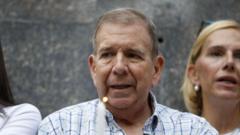This website uses cookies so that we can provide you with the best user experience possible. Cookie information is stored in your browser and performs functions such as recognising you when you return to our website and helping our team to understand which sections of the website you find most interesting and useful.


Venezuelan opposition candidate Edmundo González has said he was "forced" to recognise President Nicolás Maduro as the winner of July's disputed election before being allowed to seek asylum in Spain.
In a video message, González said Maduro's aides had coerced him into signing a letter while he was hiding in the Spanish embassy in Venezuela's capital Caracas earlier this month.
But Jorge Rodríguez, the head of Venezuela's National Assembly and a key Maduro ally, said González had willingly written his signature.
Electoral authorities loyal to Maduro announced him the victor in the election - something which was disputed by González, and many sections of the international community.
In Wednesday's video message from Madrid on X, González, 75, said Maduro's aides had brought him the letter, claiming that "I had to either sign it or deal with the consequences".
"There were very tense hours of coercion, blackmail and pressure.
"At that point I considered I could be of more use free than if I were imprisoned," González said, describing the signed letter as "worthless".
González, who has now been granted asylum in Spain, referred to himself as the "president-elect of millions and millions of Venezuelans who voted for change, democracy and peace", vowing to "fulfil that mandate".
Following Gonzalez's statement, Maduro ally Rodríguez presented the letter, which he said was signed by González of his own volition.
At a press conference in Caracas on Wednesday, he also gave González "24 hours" to take back his assertions, saying that otherwise he would publish audio of their conversations debunking the opposition candidate's claims.
“If you signed under pressure how is it that one of your daughters still lives in Venezuela peacefully, with her family, as regular Venezuelans?
"Venezuelans can think in one way or another and all of them have a place in the territory of the Bolivarian Republic of Venezuela. Here there's no place for violence or fascism," Rodríguez said.
He also showed photos of an alleged meeting between himself, Vice-President Delcy Rodríguez and González at the Spanish embassy in Caracas on the eve of the opposition candidate's departure earlier this month.
Prior to his departure for Spain, a Venezuelan judge had issued an arrest warrant for González, accusing him of conspiracy and of forging documents, among other "serious crimes" - all things Gonzalez denied.
Venezuela's National Electoral Council (CNE) claims Maduro, 61, won 52% of the vote in the 28 July elections. It gave González 43%.
The opposition, however, said it had evidence González had won by a comfortable margin, and uploaded detailed voting tallies to the internet which suggest González beat Maduro convincingly.
The US, the EU and the majority of foreign governments have refused to accept Maduro as the winner without Caracas releasing detailed voting data to prove the result.
The CNE has said it cannot publish the voting records because the data has been corrupted by hackers.



 Africana55 Radio
Africana55 Radio 
